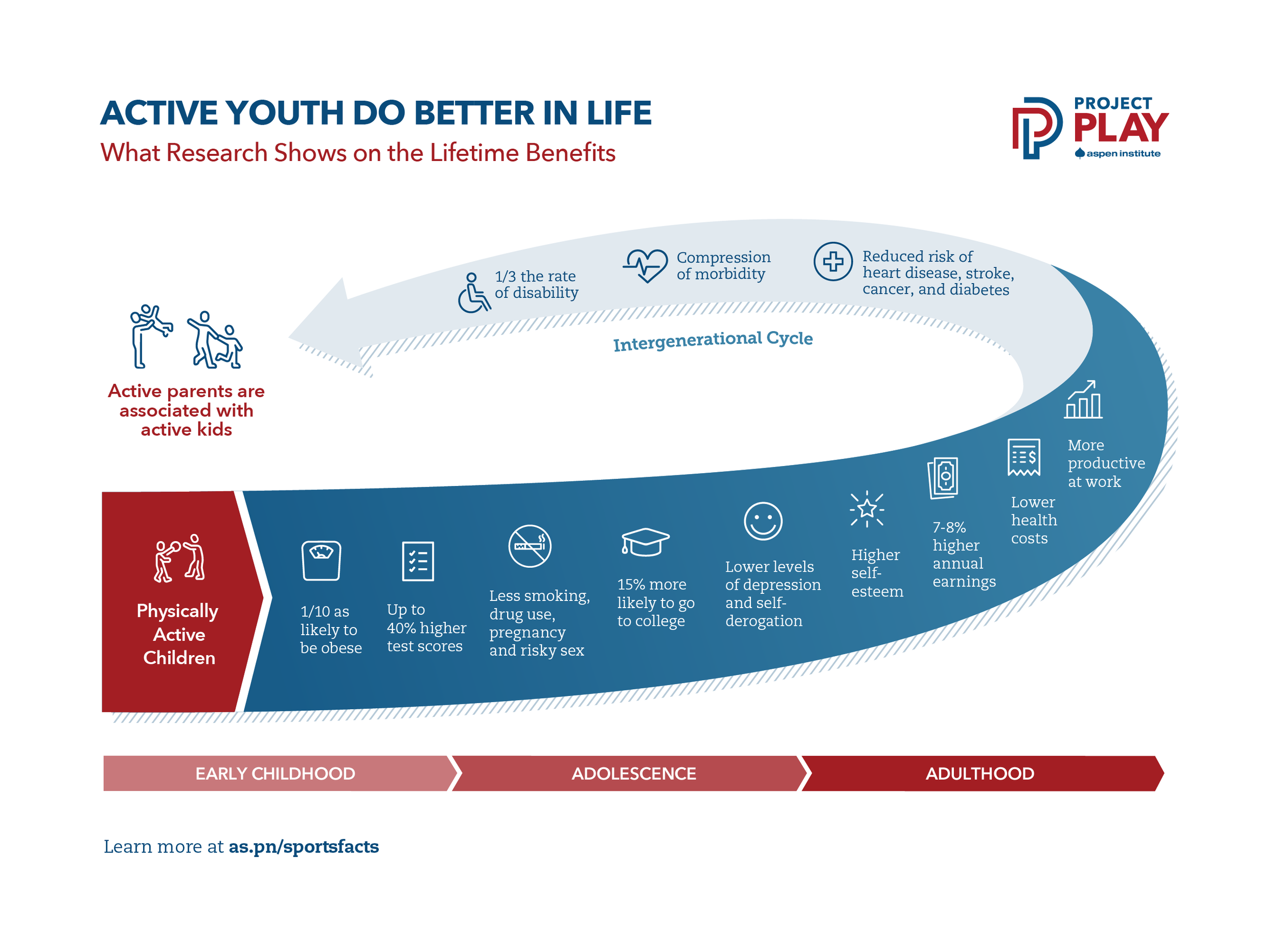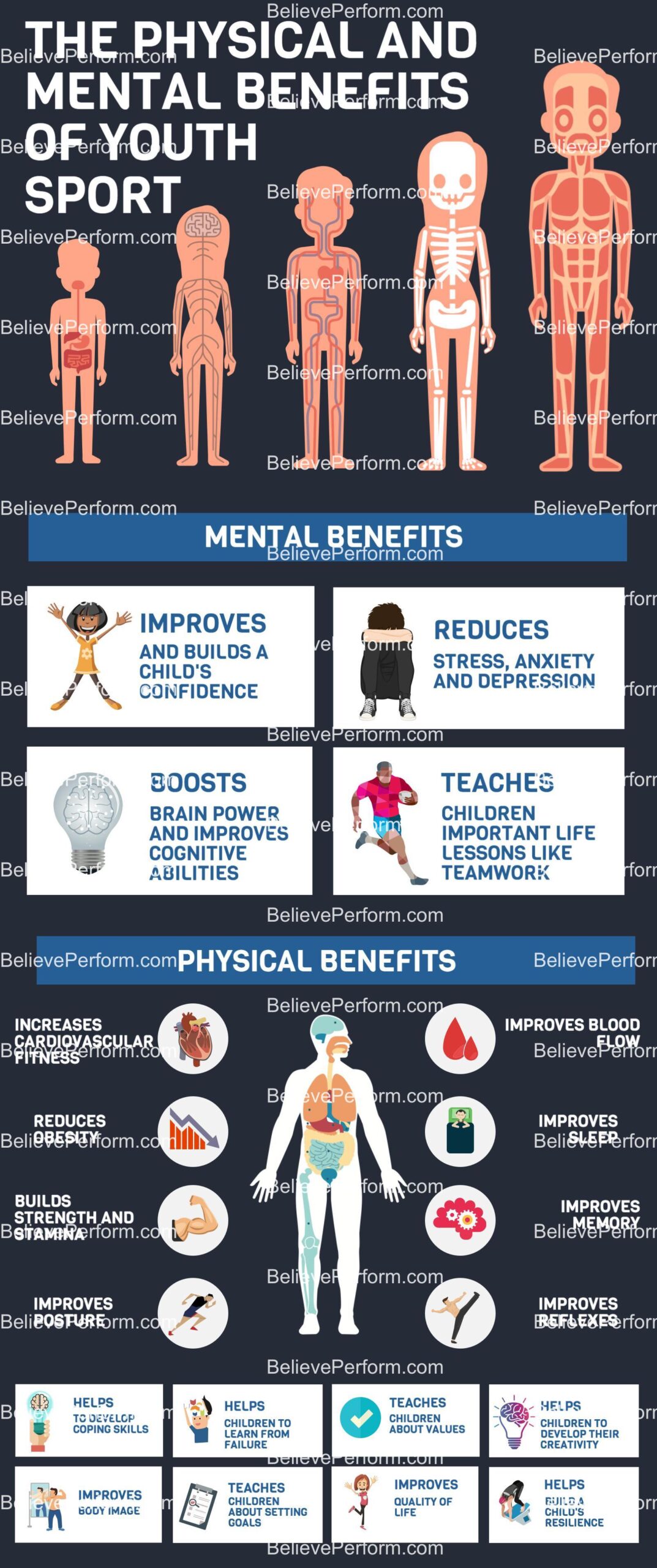Youth sports offer numerous benefits, including physical fitness, teamwork, and discipline. They also promote mental well-being and social skills.
Youth sports play a crucial role in a child’s development. Participation in sports helps children stay active, reducing the risk of obesity and related health issues. It teaches essential life skills such as teamwork, discipline, and time management. Engaging in sports fosters a sense of community and belonging, which is vital for social development.
Children learn to handle success and failure, building resilience. The structured environment of youth sports also promotes mental well-being, reducing stress and anxiety. Parents and educators should encourage children to participate in sports for holistic growth and a balanced lifestyle.

Credit: projectplay.org
Physical Health Advantages
Youth sports offer numerous physical health advantages. Children who participate in sports enjoy improved fitness and reduced risk of obesity. These benefits contribute to overall well-being and a healthier lifestyle.
Enhanced Fitness
Engaging in sports activities helps children develop enhanced fitness levels. Regular physical activity strengthens muscles and bones. It also improves cardiovascular health, making the heart and lungs stronger.
Sports also enhance flexibility and coordination. Children become more agile and balanced. These skills help in day-to-day activities and reduce injury risk.
Obesity Prevention
Participating in sports is a fun way to prevent obesity. Physical activities burn calories and maintain a healthy weight. Children who play sports are less likely to be overweight.
Sports also promote healthy eating habits. Athletes understand the importance of nutrition for performance. This knowledge helps in making better food choices and avoiding junk food.
Below is a table showing the average calories burned per hour in different sports:
| Sport | Calories Burned (per hour) |
|---|---|
| Soccer | 600 |
| Basketball | 500 |
| Swimming | 700 |
| Running | 800 |
Sports help children stay active and fit. They learn valuable life skills while having fun.
Mental Health Benefits
Youth sports offer numerous mental health benefits. These activities help children develop resilience, confidence, and positive self-esteem. Engaging in sports provides a structured environment where they learn valuable life skills. Youth sports also foster a sense of belonging and teamwork.
Stress Relief
Playing sports helps children relieve stress. Physical activity releases endorphins, which are natural stress relievers. This can help reduce anxiety and tension. A structured routine and regular exercise can make children feel more in control. Having a break from schoolwork and other responsibilities can also ease their minds.
Improved Mood
Regular participation in sports can improve mood. The endorphins released during exercise create a feeling of happiness. Team sports provide social interaction, which can boost spirits. Achieving goals and making progress in sports can also enhance self-esteem. Positive feedback from coaches and teammates further lifts mood and morale.
Social Skills Development
Youth sports offer many benefits. One of the most important is social skills development. Playing sports helps children interact with others. It teaches them how to work together and communicate effectively.
Teamwork
Team sports require children to work together. They learn to rely on each other. This builds a sense of trust and cooperation. Children discover their strengths and weaknesses. They understand how to use these to help the team.
Children also learn to support their teammates. They cheer for each other. They learn to celebrate wins and handle losses together. This strengthens their bond and friendship.
Communication
Effective communication is key in sports. Children learn to express their ideas clearly. They also learn to listen to their teammates. This helps them make better decisions.
Children also learn non-verbal communication. They understand body language and facial expressions. This skill helps them both on and off the field. It improves their ability to understand others.
| Skill | Description |
|---|---|
| Teamwork | Learning to work together and trust each other. |
| Communication | Expressing ideas and listening to others. |
- Children learn to support each other.
- They build lasting friendships.
- They improve their decision-making skills.
Building Discipline
Youth sports are essential for developing discipline. This section explores how sports help in building discipline through two main aspects: Time Management and Self-Control.
Time Management
Playing sports teaches kids to manage their time. They need to balance school, practice, and family.
- Kids learn to prioritize tasks.
- They become better at setting goals.
- They develop routines that help them stay organized.
These skills are useful for their entire life. Good time management leads to less stress and more success.
Self-control
Sports require self-control. Players must follow rules and respect others.
- They learn to control emotions during games.
- They understand the importance of fair play.
- They develop patience and persistence.
Self-control helps kids make better decisions. It also builds strong character and improves social skills.
| Benefit | Details |
|---|---|
| Time Management | Helps balance school, practice, and family life. |
| Self-Control | Teaches patience, fair play, and emotional control. |
Academic Improvement
Youth sports offer numerous benefits beyond physical fitness. One significant advantage is academic improvement. Engaging in sports helps students enhance their academic performance. Let’s explore how sports contribute to better focus and higher grades.
Better Focus
Participating in sports requires concentration and discipline. These skills translate to the classroom. Students who play sports learn to manage their time effectively. They develop the ability to concentrate on tasks. Sports teach them to stay focused during lessons and homework.
Physical activity also boosts brain function. Exercise increases blood flow to the brain. This improves cognitive abilities. As a result, students can pay better attention in class. They also retain information more effectively.
Higher Grades
Active students often achieve better grades. Sports teach essential life skills. These include teamwork, perseverance, and goal-setting. These skills help students excel academically. They learn to work hard and stay committed to their studies.
Research shows a positive correlation between physical activity and academic performance. A study found that students who participate in sports have higher GPAs. They also perform better on standardized tests.
Sports also provide a healthy outlet for stress. Students who manage stress effectively are more likely to succeed in school. Regular exercise helps reduce anxiety and improve mood. This creates a better environment for learning and academic achievement.
Self-esteem Boost
Youth sports provide a significant boost in self-esteem. Participating in sports helps children feel more confident and valued. This improvement in self-esteem has long-term benefits for their mental health and social interactions.
Confidence Building
Engaging in sports builds confidence in young athletes. They learn new skills and improve over time. As they see their progress, they feel more capable. This confidence extends beyond the sports field, helping them in school and social situations.
Sense Of Achievement
Children gain a strong sense of achievement through sports. Winning games and achieving personal goals provide a sense of accomplishment. They learn the value of hard work and dedication.
This sense of achievement is crucial for building self-worth. It helps them to set and reach goals in other areas of life.
Lifelong Healthy Habits
Youth sports instill habits that promote health throughout life. Kids who play sports learn skills that benefit them forever. These skills include staying active and eating well. Below, we explore two main benefits of youth sports in creating lifelong healthy habits.
Active Lifestyle
Youth sports encourage an active lifestyle. Kids who play sports move their bodies more. This movement helps build strong bones and muscles. It also improves heart health and reduces stress. Regular exercise from sports forms a habit of staying active. This habit often continues into adulthood.
Here is a simple table showing some benefits of an active lifestyle:
| Benefit | Description |
|---|---|
| Strong Bones | Sports activities increase bone density. |
| Muscle Strength | Playing sports builds and maintains muscle. |
| Heart Health | Regular exercise reduces heart disease risk. |
| Stress Reduction | Physical activity lowers stress levels. |
Healthy Eating
Involvement in youth sports also promotes healthy eating. Athletes need good nutrition to perform well. This need teaches kids to choose healthy foods. They learn to eat fruits, vegetables, lean proteins, and whole grains. These choices fuel their bodies for peak performance.
Here is a list of healthy foods often chosen by young athletes:
- Fruits like apples and bananas
- Vegetables like carrots and spinach
- Lean proteins like chicken and fish
- Whole grains like oatmeal and brown rice
These eating habits often carry into adulthood. People who played sports as kids tend to make healthier food choices. This leads to better overall health and wellness.

Credit: twitter.com
Community Engagement
Youth sports offer more than just physical activity. They foster community engagement, which benefits children in many ways. Engaging with the community helps kids develop essential social skills and a sense of belonging.
Volunteer Opportunities
Youth sports provide numerous volunteer opportunities for kids and families. Volunteering can include tasks like:
- Coaching younger teams
- Assisting with event setup
- Organizing fundraisers
These activities teach responsibility and the value of helping others. Kids learn how to manage time and work as a team. Parents also get involved, creating a supportive environment for everyone.
Building Relationships
Playing sports helps in building relationships with peers and adults. Kids meet teammates and coaches who become friends and mentors. These relationships often extend beyond the field or court.
Here are some benefits of building relationships through sports:
| Benefit | Explanation |
|---|---|
| Teamwork | Kids learn to work together towards a common goal. |
| Communication | Sports encourage open and effective communication. |
| Support System | Teammates provide emotional and social support. |
Children also interact with community members during games and events. This broadens their social network and enhances their sense of community.

Credit: members.believeperform.com
Frequently Asked Questions
What Are The Benefits Of Youth Sports?
Youth sports boost physical health, social skills, and teamwork. They improve self-esteem and discipline. Children also learn goal-setting and time management.
How Do Youth Sports Improve Mental Health?
Youth sports reduce stress and anxiety. They promote mental well-being and resilience. Physical activity releases endorphins, enhancing mood and focus.
Why Is Teamwork Important In Youth Sports?
Teamwork in youth sports teaches cooperation and communication. It builds trust and camaraderie. Working together towards a common goal fosters strong relationships.
How Do Youth Sports Teach Discipline?
Youth sports require practice and adherence to rules. They instill discipline and commitment. Athletes learn the importance of hard work and persistence.
Conclusion
Youth sports offer numerous benefits, from physical fitness to character development. They help build teamwork, discipline, and resilience. Engaging in sports also promotes mental well-being and social skills. Encourage your children to participate in youth sports for a healthier and more balanced life.
The rewards extend well beyond the playing field.




